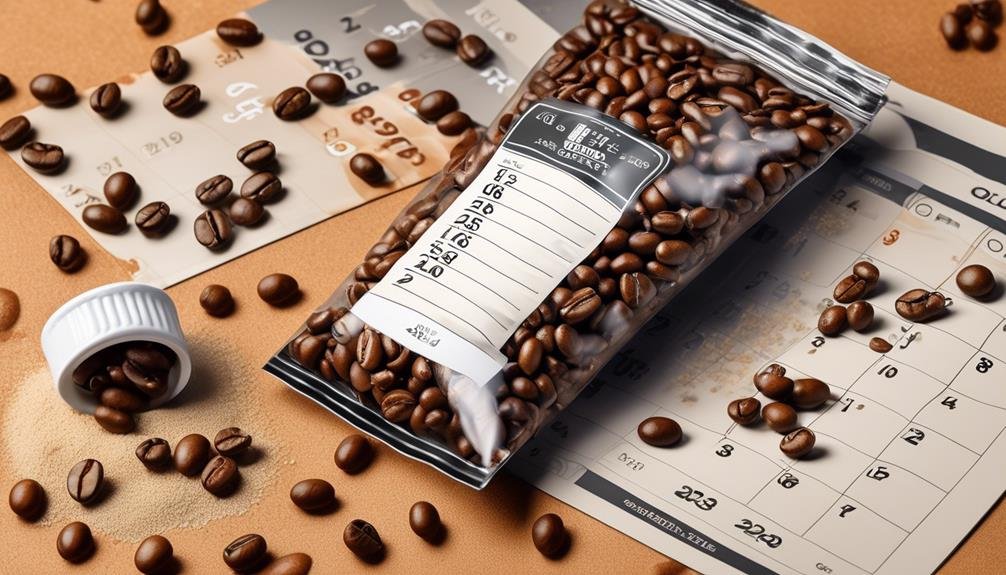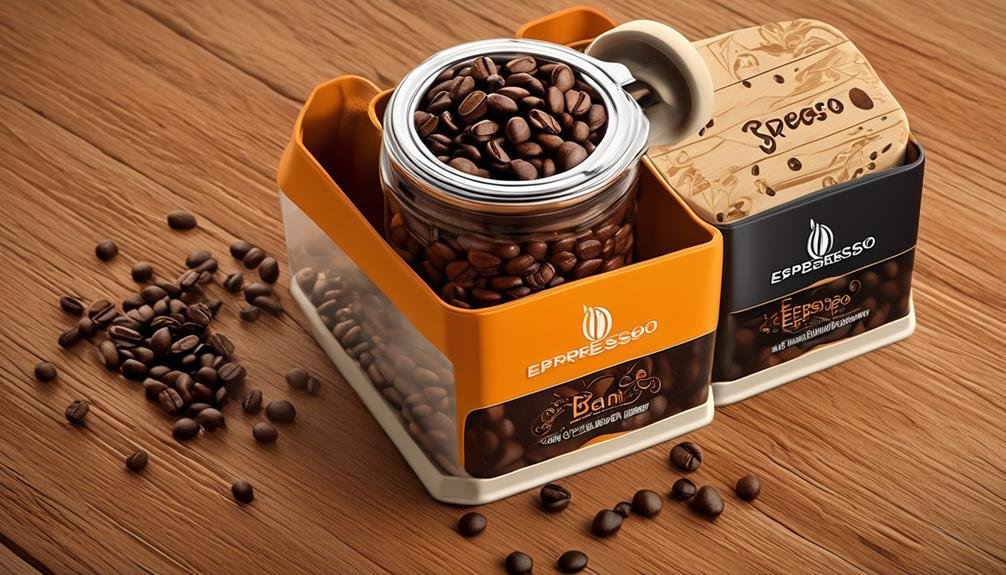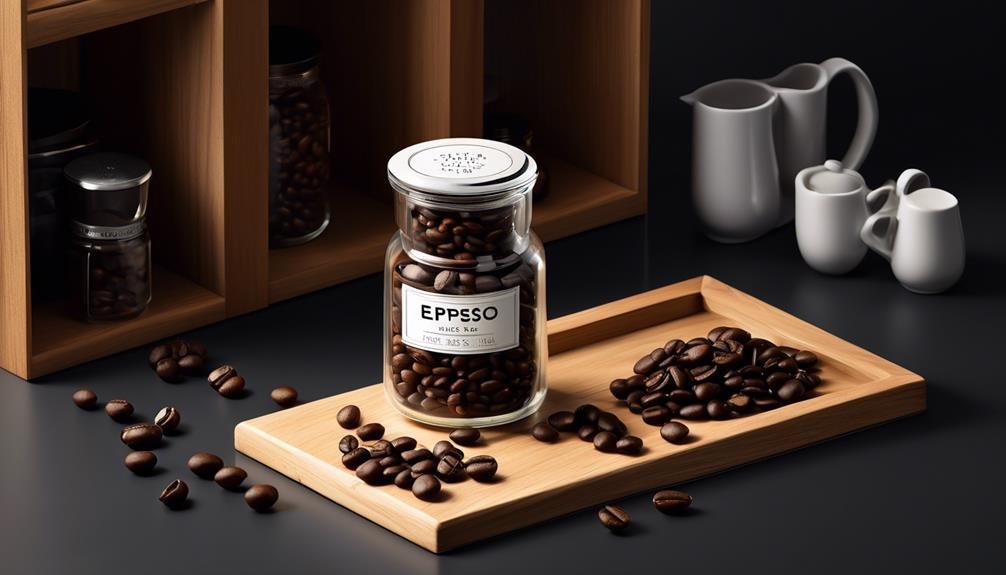Like a ticking time bomb, ground espresso beans have a limited lifespan that can be influenced by various factors. But how long can you expect them to last? And what happens when you open that bag of aromatic goodness?
The answer lies in the delicate dance between proper storage conditions and the freshness of your beans. So, grab your cup of joe and get ready to discover the secrets of maximizing the shelf life of your ground espresso beans. After all, nobody likes a stale brew, right?
Key Takeaways
- Proper storage conditions, such as storing ground espresso beans in a cool, dark, and dry place, can help maintain their quality and freshness.
- Ground espresso beans have a shorter shelf life compared to whole beans due to increased exposure to air and oxidation.
- Using opaque, airtight containers and vacuum sealing can help prevent oxidation and extend the shelf life of ground espresso beans.
- Stale ground espresso beans can be identified by lack of aroma, grainy and dry texture, diminished flavor and appearance, and a bitter and sour taste when brewed.
Factors Affecting Shelf Life
To understand the factors that affect the shelf life of ground espresso beans, it's important to consider several key elements.
One of the main factors is the oxidation process. When coffee beans are roasted, they undergo a chemical reaction that releases natural oils. When these oils come into contact with air, they begin to oxidize, leading to a loss of flavor and freshness. This oxidation process is accelerated when the beans are ground, as the increased surface area exposes more of the oils to the air. As a result, ground coffee has a shorter shelf life compared to whole beans.
Another factor that affects the shelf life of ground espresso beans is the type of roast. Darker roasts degas quicker than lighter roasts. This means that they release carbon dioxide more rapidly, which can impact the flavor and freshness of the beans. Therefore, darker roasts tend to have a shorter shelf life compared to lighter roasts.
Proper storage conditions also play a crucial role in maintaining the quality of coffee beans. It's important to store ground espresso beans in a cool, dark, and dry place. This helps to minimize exposure to light, heat, and moisture, which can all contribute to the deterioration of the beans. Additionally, using an airtight container or vacuum-sealed bags can further protect the beans from air, preserving their flavor and freshness for a longer period of time.
Proper Storage Conditions
Consider the impact of proper storage conditions on maintaining the quality and freshness of ground espresso beans. The way you store your coffee beans can have a significant effect on their shelf life and taste. Here are some important tips to keep your ground espresso beans fresh for as long as possible:
- Protect from external factors: Store your ground espresso beans in a cool, dark, and dry place to prevent exposure to heat, sunlight, air, and moisture. These elements can cause the beans to deteriorate and lose their freshness.
- Choose the right container: Opt for an opaque, airtight container to store your opened ground espresso beans. This will minimize their exposure to air and light, which can negatively impact their quality. Remember to remove as much oxygen as possible from resealable bags before sealing to preserve the beans' freshness.
- Consider vacuum sealing: To extend the shelf life of your ground espresso beans and maintain their flavor, you may want to consider vacuum sealing them. This method effectively removes air from the container, further preventing oxidation and deterioration.
How Long Ground Espresso Beans Last

Ground espresso beans have a shorter shelf life compared to whole coffee beans, lasting about one week after opening for optimal freshness. This is because ground espresso beans have a much larger surface area compared to whole beans, which makes them more susceptible to losing flavor and freshness over time. To make your ground espresso beans last longer, it's important to store them properly.
Firstly, make sure to keep your ground espresso beans in an airtight container. This will help to prevent exposure to air, which can cause the beans to go stale. Additionally, store the container in a cool, dark, and dry place. Heat, light, and moisture can all contribute to the deterioration of the beans' flavor and freshness.
Furthermore, it's recommended to only grind the amount of beans you need for each cup of coffee. This will help to ensure that you're using the freshest grounds possible. If you have leftover grounds, it's best to store them in an airtight container and use them within a week.
Signs of Stale Ground Espresso Beans
How can you tell if your ground espresso beans have gone stale?
There are several signs that indicate that your ground espresso beans have lost their freshness and flavor. Here are some key indicators to look out for:
- Lack of Aroma: Stale ground espresso beans lack a strong aroma or have little to no aroma at all. The vibrant and enticing scent that fresh beans possess is diminished or completely absent in stale beans.
- Texture: The texture of stale ground espresso beans becomes grainy and dry. Instead of the smooth and consistent texture of fresh grounds, stale beans may feel coarse and uneven.
- Flavor and Aroma: Stale ground espresso beans lack the bold flavor and aroma that fresh beans possess. The rich, robust taste and enticing aroma are diminished, leaving you with a less satisfying cup of espresso.
- Appearance: Freshly roasted espresso beans have a shiny surface, while stale ones may appear dull or lackluster. This visual change is a clear indication that the beans have lost their freshness.
- Taste: When brewed, stale ground espresso beans produce espresso with a bitter and sour taste, lacking the characteristic crema. This is a stark contrast to the smooth and balanced flavor profile of coffee made from fresh beans.
Shelf Life of Roasted Espresso Beans Vs Ground Espresso Beans

The shelf life of roasted espresso beans differs from that of ground espresso beans due to their varying surface area and exposure to air. Whole roasted espresso beans have a longer shelf life compared to ground espresso beans. Unopened whole roasted espresso beans can last between 6-9 months, while unopened ground espresso beans have a shorter shelf life of 3-5 months. Once opened, ground espresso beans should be used within a few days to maintain optimal freshness. On the other hand, opened whole roasted espresso beans should be consumed within six months to ensure their quality.
The larger surface area of ground espresso beans makes them more susceptible to going stale quicker than whole roasted espresso beans. To maximize the shelf life of roasted espresso beans, it's important to store them in a cool, dark, and dry location. Airtight containers, such as coffee bags, are recommended to protect the beans from exposure to air and moisture, which can degrade their freshness.
Best Practices for Storing Freshly Ground Espresso Beans
To ensure the optimal freshness of your ground espresso beans, it's essential to follow best practices for storage. Here are some key tips to help your coffee beans stay fresh for longer:
- Use an opaque, airtight container: Protect your freshly ground espresso beans from air, moisture, heat, and light by storing them in a container that blocks out these elements. This will help preserve the flavor and aroma of your coffee.
- Buy only what you need: Ground espresso beans lose their flavor and freshness quickly due to their increased surface area. It's best to purchase only the amount you need for a week or so, ensuring that you always have fresh-tasting coffee.
Following these best practices will help your ground espresso beans stay fresh and maintain their peak flavor. When stored properly, your coffee will be ready to deliver the perfect cup every time.
Remember to dispose of any moldy beans to avoid health risks and to ensure the freshness of your coffee. Storing your coffee correctly is a simple yet crucial step in maintaining its freshness even after it has been ground.
Common Questions About Espresso Bean Storage

For optimal storage of your ground espresso beans, it is important to address common questions regarding their shelf life. How long do coffee beans last as long as possible? Can you still use an opened bag of ground espresso beans? How can you keep your coffee fresh for as long as possible? These are all valid concerns when it comes to maximizing the life span of your favorite brew.
To help answer these questions, here is a table summarizing the key points about espresso bean storage:
| Storage Method | Shelf Life |
|---|---|
| Opened Bag | Up to 1 week |
| Sealed Bag | 3-4 weeks in fridge |
| Unopened Pack | Several months |
When you open a bag of ground espresso beans, they start to lose their freshness. To ensure the best flavor, it is recommended to use them within a week. However, if you have a sealed bag, you can extend the shelf life by storing it in the fridge in an airtight container. This can keep your ground espresso beans fresh for up to 3-4 weeks.
If you have an unopened pack of ground espresso beans, they can last for several months. It is important to store them in a cool and dry place away from direct sunlight to maintain their quality.
Tips for Enjoying Fresh Espresso Every Time
To ensure your espresso is always fresh and flavorful, follow these tips:
- Store your coffee beans within an air-tight, opaque container to protect them from exposure to light and air. This will help maintain their flavor for a longer period of time. Ground espresso, on the other hand, has a larger surface area and goes stale quicker than whole beans.
- Keep your coffee beans in a cool, dark, and dry place. Avoid placing them near heat or sunlight, as these factors can lead to flavor deterioration.
- Use your coffee beans or ground espresso within one week of opening for optimal freshness. After this period, the flavor begins to degrade, and the taste may not be as satisfying.
- If you notice any signs of mold on your coffee beans or ground espresso, it's important to dispose of them immediately. Mold can lead to health risks and affect the quality of your espresso.
- Consider a coffee subscription service that delivers freshly roasted beans to your doorstep on a regular basis. This way, you can ensure a constant supply of fresh beans for your espresso enjoyment.
Frequently Asked Questions
How Long Are Espresso Beans Good for After Grinding?
After grinding, espresso beans are good for 1-2 weeks for optimal freshness. Store them in an airtight container in a cool, dark, and dry place. Avoid extended storage as flavor and freshness will diminish.
How Many Years Does Ground Coffee Last?
Ground coffee lasts about one year unopened, but once opened, it should be used within a week for optimal freshness. Ground coffee goes stale quicker than whole beans, so store it in an airtight container in a cool, dark, and dry place.
Are 2 Year Old Coffee Beans Still Good?
No, 2-year-old coffee beans are not still good. Coffee beans lose flavor and freshness over time, even if unopened. For optimal freshness, use opened coffee beans within one week.
Can You Use Expired Espresso Powder?
Yes, you can use expired espresso powder, but it may have lost some of its flavor and potency. The taste may not be as strong or robust as fresh powder.
Conclusion
In conclusion, the shelf life of ground espresso beans can vary depending on storage conditions and whether the beans are opened or unopened. Unopened ground espresso beans can last for about three to four weeks when stored in the fridge in an airtight container.
Once opened, they should be used within a day for optimal freshness. It's important to store them in a cool, dark, and dry place to maintain flavor and quality.
Remember these best practices for enjoying fresh espresso every time.




